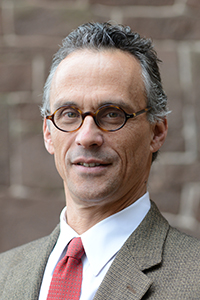The Jewish Daily Forward has published an in-depth interview with Assistant Professor of Art Sasha Rudensky '01. The conversation ranges from her immigration to the U.S. from Moscow at age 9 to her start as an artist to her latest photography project, Eastern Eve. Hannah Rubin '13, a former student of Rudensky, wrote the story as part of a larger series she's working on that spotlights Jewish female artists. Rubin describes Rudensky's work: "She uses her photography as a means of personally investigating the contradictions and continuities of contemporary Russian culture. Though her work defies being labeled as 'feminine,' it culls from a sensibility that is distinctly gentle and yet…
Kari Weil, the University Professor of Letters, was a guest on WNPR's "The Faith Middleton Show" to discuss how our evolving understanding of animals should affect how we treat them personally and professionally. They began by discussing the announcement that Ringling Bros. and Barnum & Bailey would stop using elephants in their circus performances within three years. "I think there is a fine line between use and abuse," said Weil."I don't think all use is abuse. I think animals depend on us, we depend on them. We can use certain animals for certain things, but when we're down to exploitive techniques like bull hooks…
President Michael Roth reviewed The End of College by Kevin Carey for The Atlantic. Though it might be tempting to dismiss the book as just another doomsday declaration about higher education, writes Roth, Carey's "call for more accessible student-centered universities is a powerful response to some of the real problems that beset these institutions today." Carey visits a handful of colleges and universities, including some--Harvard, Stanford, MIT--that admit fewer than 10 percent of applicants. "This dynamic of exclusivity is, Carey contends, about to change. Big time," writes Roth. Carey signs up for an online biology class from MIT, and proudly reports his test scores.…
Lori Gruen, professor and chair of philosophy, writes in Al Jazeera about the announcement this month by Ringling Bros. and Barnum & Bailey that it would phase out the use of elephants in circus shows by 2018 in response to a "mood shift among our consumers." Gruen explores how this public change in attitudes came to be. She credits, in part, "the tireless animal activists who appear regularly, rain or shine, to protest when the circus comes to town." These activists highlight the cruel and unhealthy living conditions imposed upon the elephants, such as having their legs chained, lacking adequate exercise, and withstanding…
Writing in Tikkun Magazine, government major Rachel Unger '15 offers a first-hand account of Israeli-Palestinian relations she witnessed during her two trips to the region, and how these experiences shaped her views of a "two-state solution" to the ongoing conflict. Unger describes watching "religious Jews marching through the Muslim quarter of the Old City celebrating the 'reunification' of Jerusalem while the authorities blocked Palestinians from the streets with barricades and prevented an old man from taking the bus to his home. I witnessed police knocking a Palestinian man to the ground while hordes of young Yeshiva boys cheered and sang 'Am Yisrael Chai!'" She…
Lori Gruen, professor and chair of philosophy, discussed her new book, Entangled Empathy: An Alternative Ethic for Our Relationships with Animals, with University of Colorado Professor Emeritus Mark Bekoff in The Huffington Post. Bekoff calls the book "a wonderful addition to a growing literature in the transdisciplinary field called anthrozoology, the study of human-animal relationships." Gruen defines "entangled empathy" as "a process whereby we first acknowledge that we are already in relationships with all sorts of other animals (humans and non-humans) and these relationships are, for the most part, not very good ones. We then work to figure out how to make them better and that…
An essay by Associate Professor of History Jennifer Tucker is included in The Five Photographs that (You Didn’t Know) Changed Everything, a five-part BBC radio series focusing on historically important yet little-known photographs. In her segment, The Tichborne Claimant, Tucker tells the story of how an 1866 photograph of a butcher in Wagga Wagga, Australia, played a central role in a case that gripped Victorian Britain and had an enormous impact on our legal system, raising questions about what photography is for and how it should be used. Says Tucker: “Sometimes even a mundane photograph can have a powerful and…
President Michael S. Roth writes in The Wall Street Journal about the importance of exploring religious feelings and experiences in humanities education, and why these topics make students so uncomfortable.
Peter Rutland, the Colin and Nancy Campbell Professor in Global Issues and Democratic Thoughts, writes in the Mirror (U.K.) about the threat to the West by Russian President Vladimir Putin. He considers the comparison made by British Defense Secretary Michael Fallon to the Islamic State. While "Putin's people are not beheading Christians or burning captives alive," writes Rutland, Russia has nuclear weapons — lots of them. "And is willing to use them if necessary," he writes. "Deterrence only works if both sides see each other as unwilling to risk war. And [Putin] believes the West will not risk nuclear conflict over where to…
Richard Grossman, professor of economics, is featured in a radio interview with Share Radio in London Feb. 19. In the interview, Grossman talks about the consequences of the European Central Bank's new quantitative easing (QE) policy, which may stimulate an economy when a standard monetary policy has become ineffective. The ECB's action follows in the footsteps of the central banks of Japan, the United Kingdom, and the United States, which also have used quantitative easing in the 2000s. A concern that has been raised about the introduction of QE is that persistent low interest rates will lead to another boom-bust…
Early this year, Gary Shteyngart embarked on an experiment for The New York Times: For a week straight, he would "subsist almost entirely on a diet of state-controlled Russian television, piped in from three Apple laptops onto three 55-inch Samsung monitors in a room at the Four Seasons Hotel in Manhattan." Assistant Professor of Art Sasha Rudensky documented this experiment in a series of photographs that accompany the story. Here is Shteyngart lying in bed, feet encased in hotel slippers, while Russian President Vladamir Putin's stern face fills three towering television screens. Here Shteyngart is dining on Wagyu beef slices and sipping pinot noir…
The Hartford Courant and WNPR both featured stories on Wesleyan's "observatory nights," which began this month. Every Wednesday night at 8 p.m. during the Spring semester, the Van Vleck Observatory will open its doors to the public, rain or shine, for viewing of the sky through telescopes and presentations on the latest space-related research. According to the Courant, Research Assistant Professor of Astronomy Roy Kilgard said the department is seeking to supplement its outreach to groups already interested and involved in science with new sessions for people who may not have a high level of knowledge about space and astronomy. "We're really trying…



